|

songs | interviews | photos | tours | boots | press releases | timeline
SPIN (US)
October 1994
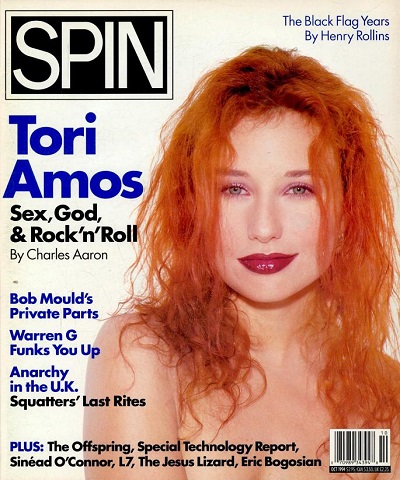
Sex, God, and Rock 'N' Roll
A jarring mix of good-girl hair and bad-blood confessions, Tori Amos offers up songs so profane and sexually charged they could only come from a minister's daughter. Charles Aaron loses his religion.
God may not play dice with the universe, but He sure runs a convincing grift, so you take what you can get. And when you're a spiritually and sexually beggared teen growing up in an environment where "denial" isn't the last word in a dead pop star's biggest hit, you take and take, particularly from strangers, often in the lamest, most sterile places.
Welcome to the North Carolina Performing Arts Center. Situated next to Founder's Hall, a mall in downtown Charlotte, this four-tiered dud of New South theater design looks like what would happen if Orange Julius joined forces with oral Roberts. Opera boxes trimmed in rust and teal carpet hover above genial white-haired ushers who sport crisp green blazers and look thrilled that they're not ringing up Happy Meals at McDonalds's.
If anyone in pop music could transform this would-be evangelical snack bar into an intimate refuge for blunt desire, it's Tori Amos. And the sold-out auditorium, full of fresh-faced, well-mannered white girls - boyfriends in tow - is flush with expectancy. The audience knows that the 31-year-old pianist-singer isn't the least bit bashful about bashing the genteel, guilt-driven culture that still prevails in middle-class mall America.
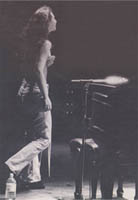 A hometown good girl-born the daughter of a Methodist minister in Newton, a nearby textile town known for its manufacture of gloves, athletic socks, and football families - Amos risked saying what bad girls say and was rewarded with platinum and gold albums: 1991's Little Earthquakes and this year's Under the Pink. Like Joni Mitchell with a fresh mouth and a shock of copper-red hair, Amos writhes on her piano bench and sings about God as a put-upon disappointment who keeps a "9 iron in the backseat just in case" and needs a women to look after him. She brashly feeds the constant craving for a less oppressive spiritually in a country where most folks still believe in God, but fewer and fewer believe in religion.
A hometown good girl-born the daughter of a Methodist minister in Newton, a nearby textile town known for its manufacture of gloves, athletic socks, and football families - Amos risked saying what bad girls say and was rewarded with platinum and gold albums: 1991's Little Earthquakes and this year's Under the Pink. Like Joni Mitchell with a fresh mouth and a shock of copper-red hair, Amos writhes on her piano bench and sings about God as a put-upon disappointment who keeps a "9 iron in the backseat just in case" and needs a women to look after him. She brashly feeds the constant craving for a less oppressive spiritually in a country where most folks still believe in God, but fewer and fewer believe in religion.
And remarkably, her parents still like her. In fact, they're in town for the show and easily recognizable about ten rows back in the orchestra section. While Led Zeppelin's "Dazed and Confused" fades into a spaghetti-western, dance-beat fanfare and Amos takes the stage, the only sixty-something clerical couple in the house beams proudly. But about 20 minutes later, those same smiles are through gritted teeth. Introducing "Icicle," a shorthand concerto from Under the Pink about a girl who masturbates in her bedroom while the family sings Easter prayers downstairs, Amos goes off.
"I had two families growing up," she begins, referring to her father's (both parents were Disciples of Christ ministers from Virginia) and her mother's (part Cherokee from North Carolina). "I always thought of them as the 'bad' and 'good' sides people. It's like the concept of the mango-dry and juicy, you know.
"Some people get baptized with sprinkles, well, I had my head down in the water for 25 years. I learned some really tuneless hymns to sing in the shower" - she drones a dirge of obedience - "and then I started listening to Robert Plant and Jimmy Page and you know what?" She breathily exhales Zep's "Rock and Roll." "I realized Jesus wasn't downstairs. But I'd like to thank my dry side, because without it I'd have nothing to write about."
This wasn't Sinead O'Connor's blindly raging rejection of her abusive upbringing or even Madonna's sweetly awkward meeting with her dad amid the spectacle of Truth or Dare. Instead, here was a woman, alone onstage, virtually face to face with her entire past, making her case with no hemming or hawing, no reassuring glances or knowing winks. Simply, she was saying, Your way of life was a bad joke, and now, I'm delivering the punch lines. It wasn't some dramatic fuck you. Just a reasonable statement of sexual purpose anybody could understand. And the hometown girls convulsed with cheers.
Later, after her hour-and-fifty minute performance ended with a standing ovation, Amos flops into an armchair and anxiously awaits her room-service pick-me-up - a Coke float (soda and vanilla ice cream). In a stretchy striped dress, hiking boots, and that hair, she's uniquely pretty by anyone's standards. But when she starts talking -- funny, cynical, earnestly grasping -- she's something more, the cool big sister you saw on TV or in the movies, but never at home.
 SPIN: I passed your parents in the hallway. They seemed to be in good spirits.
SPIN: I passed your parents in the hallway. They seemed to be in good spirits.
Tori: They're on their way to Florida. They just retired and they're going down to live there.
SPIN: That was pretty harsh what you said about the "good" and the "bad" sides of your family, what with both sides sitting right there in front of you.
Tori: Yeah, but I don't believe in censorship for my shows. If anyone chooses to come and it makes them uncomfortable, then they shouldn't come. I can't change it for them.
SPIN: Still, it must be weird for them to sit there and be called Mr. Dry and Ms. Juicy.
Tori: I think my mother loved it.
SPIN: She doesn't get ruffled easily?
Tori: She gets ruffled at the grocery store when somebody is overcharging her for her tomatoes. But the apocalypse could be coming and she'd want to know what syrup you'd like on your biscuits. And my dad - there is a side to him that secretly wants to be James Dean. Of course, he is incredibly conservative, but at the same time - I think he always wanted a tattooed Eve with a serpent on his arm. There's a hidden personality there, so I think he can handle it. As a writer, with the material I do, I can't worry about it. I'm not going to be all careful because my parents are a little uncomfortable. For my whole life I heard their point of view, day in and day out. Masturbating was the M-word, m-m-m. it was "doing that thing with your hand." Good girls don't.
SPIN: What about the "good" side of your family?
Tori: My mother's father, the storyteller, who was part Indian, had the biggest influence on me. He had the stories and he died when I was nine. My mother's side didn't have, shall we say, "communion" with my father's side. Until his later years, my father was very rigid, very dominating. But over the years, he's had a few brushes with death, quite a few strokes; he fell off the steeple of the church once while he was tinkering. I mean, my father's almost died like six times, so it's lightened him up a bit. But when I was a kid, it was will of iron, no sense of humor, no Richard Pryor videos.
SPIN: Your father's parents were hard-core Pentecostal ministers. Were you exposed to their services?
Tori: I remember going one time and seeing them speak in tongues. I don't really remember my grandmother speaking in tongues, but every time I saw her she was always praying, devotions, always. That was her life. She was a very smart woman. She graduated from the University of Virginia in the '20s. She could interpret Byron and Shelley like nobody's business. That's why she was so dangerous. She's the type of person that I worry would have burned the witches. I think she would have been able to justify just about anything, in her mind, for Jesus. You know, there's so much sexual guilt in Christianity it's unbelievable.
SPIN: Yeah, the ultimate American goddess figure is a virgin, for christ sakes.
Tori: Maybe she just needs to swallow, right?
~ ~ ~
 This kind of talk gets most folks hot and bothered, and most artists in hot water. But with Tori Amos, it's what makes her so likeable and believable. Instead of using blasphemous, shocking setups to protect and empower herself from a distance, Amos always leans closer. When she sings, "I wanna smash the faces of those beautiful boys/Those Christian boys/So you can make me come/That doesn't make you Jesus," she's right there, smiling conspiratorially like she's letting you in on a secret. And while her performing trademark -- straddling the piano bench to engage the audience -- could be read as an insecure ploy for attention. It's more of a plea for an honest tete-a-tete.
This kind of talk gets most folks hot and bothered, and most artists in hot water. But with Tori Amos, it's what makes her so likeable and believable. Instead of using blasphemous, shocking setups to protect and empower herself from a distance, Amos always leans closer. When she sings, "I wanna smash the faces of those beautiful boys/Those Christian boys/So you can make me come/That doesn't make you Jesus," she's right there, smiling conspiratorially like she's letting you in on a secret. And while her performing trademark -- straddling the piano bench to engage the audience -- could be read as an insecure ploy for attention. It's more of a plea for an honest tete-a-tete.
SPIN: Do you ever go over the top craving attention from the audience?
Tori: [long pause] A good storyteller has a conversation with the listener. I'm very direct when I play. A lot of people don't like emotional directness. They say, "Why don't you just turn away and sing it and we'll digest it in our own way." But you came to my show to trust me. When I sat down on the porch and listened to my grandfather, I wasn't giving him a fax first on how he should tell the story.
SPIN: You're good at insinuating yourself and then making the listener fidget. Like that line in "Silent All These Years" -- "So you found a girl who thinks really deep thoughts/What's so amazing about really deep thoughts/Boy, you best pray that I bleed real soon/How's that thought for you?" I can't imagine too many guys sitting still for that.
Tori: You know, whatever hang-ups somebody has with what I'm talking about -- say I'm in a Danielle Steele mood or I'm being aggressive and catty, that might remind you of something a woman's done to you that's really pissing you off, so you're mad at me. That's fine. There has to be that moment where the audience says, "Fuck you, you cunt," or I've done something wrong. That's what telling the story's all about.
~ ~ ~
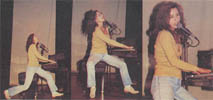 Live, Amos reworks her story-songs -- from dark, experimental showtunes with classical flourishes to squirmy, compelling ballads -- measure by measure, emphasizing different words, leaving out syllables, whispering, wailing. She refuses to let you relax, whether you're family or a stranger. And her dynamics on the piano can be astonishing (despite tendonitis that "feels like somebody put a drill" in her arm). She plays like a failed, pissed-off child prodigy. Which is exactly what she is.
Live, Amos reworks her story-songs -- from dark, experimental showtunes with classical flourishes to squirmy, compelling ballads -- measure by measure, emphasizing different words, leaving out syllables, whispering, wailing. She refuses to let you relax, whether you're family or a stranger. And her dynamics on the piano can be astonishing (despite tendonitis that "feels like somebody put a drill" in her arm). She plays like a failed, pissed-off child prodigy. Which is exactly what she is.
At two and a half years, Ellen Amos (she renamed herself Tori when she left home at 21) started playing the upright piano in the living room and jaws dropped. At four, she was doing Mozart and by six the family had moved to Maryland and enrolled her in the Peabody Institute of Johns Hopkins University, one of the country's most prestigious music programs. By age 11, she was rebelling by composing. The Peabody exam board was not receptive, and Amos left.
"The Peabody was at the concert the other night in Baltimore," she says with a grin. "The dean comes up to me and goes, 'I'm so sorry.' But he also says that I wouldn't have the sense of experimentation that I have now if I hadn't left.
"When I was 11, I was like, 'You're wrong.' And I still fight for musical decisions like nobody you've every seen fight. And musically, you can be very broken in certain conservatories and schools and not know your own mind, not develop your own opinions, and you can never be a force if you don't do that. You can be technically proficient but so what? You want to go with me tomorrow, we'll walk down the halls of a conservatory and you'll see loads of the technically proficient -- loads -- and they're all playing the same damn thing. They've got that Opus XII up and they've got it down, but who's writing Opus XII, know what I mean?
For Amos, the conservatory was just another religious dead zone, where complex figures were treated as one-dimensional sacred texts, and the students were reduced to genuflecting geeks.
"The people who play so-called classical music are sterile. The people who wrote it were imbued with life. They were the revolutionaries, and now their music gets played at stinky-cheese parties with expensive wine. It's ridiculous. Debussy is played by people who've cut off their own dicks. Debussy had syphilis -- he was very aware he had a dick."
To keep his daughter from developing fallen-prodigy syndrome. Amos's dad took her to the Georgetown section of Washington, D.C. and got her gigs playing in piano lounges and gay bars. Amos toiled on the "Feelings" circuit for years, building her play-me-a-song-Ms.-Piano-Woman nerve.
At 21, she bailed for Los Angeles, but it was a wildly unsatisfying rebellion. Her first band Y Kant Tori Read, was Streets of Fire without the nifty soundstage and silly villains, and, after a 1988 album on Atlantic (featuring Guns N' Roses drummer Matt Sorum) stiffed, she tottered away in her plastic thigh-high boots.
Having bombed at both extremes as classical darling and Nerf-metal tart -- she continued to play piano bars enduring the usual routine of cheap sentiment for sad suits. Then her luck turned from bad to brutal -- she was raped by an acquaintance. Eventually, after therapy and almost out of desperation, she began writing the songs that would make up Little Earthquakes. Atlantic exec Doug Morris heard Amos's demo and convinced her to move to London (where she still maintains a home) to restart her career in 1990. Club performances won her a devoted following, but more importantly, such songs as "Crucify" and "Me and a Gun," an a cappella account of the assault, allowed her to finally purge long-suppressed resentments she felt as a result of her family's unyielding religious convictions.
SPIN: Did you feel sexually messed-up by the church?
Tori: It's all about draining you of your passion. That's what religion is about -- cutting off the physical from the spiritual. They're disconnected, love is over here, lust is over there. For someone to say, "Oh, you can't think those thoughts because they're bad," that's just fascist. There's so much I cut off and numbed over the years because I wanted to be respected by my father because he was part of the patriarchy. If you ask most women what's important to them, they'll say respect more than anything, more than love.
SPIN: Did your father ever respect you as a woman with both a physical and a spiritual side?
Tori: Look, it's about Magdalene and the Mother Mary -- the whore and the virgin. It's either one or the other. It's not about a balance and a merging of the two. Of course, nobody wants to talk about the fact that Mother Mary had kids after Jesus. She did stuff later. Nobody wants to get into the fact that Mary was makin' bacon too.
SPIN: Yeah, somebody knocked up Magdalene and she became the whore.
Tori: Right, of course I think Mary Magdalene was simply what we call a single parent. Oh, it's all so damn silly. What, like we're supposed to believe Jesus didn't have sex? Come on. And his teachings are supposed to be less valid because his dinky had a sleeping bag somewhere. It's ridiculous.
SPIN: It's using fear to control people.
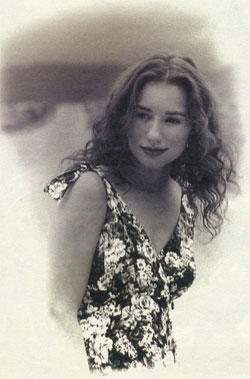 Tori: I'm not interested in anybody on this planet who wants to scare me into thinking that my soul is in jeopardy. It has absolutely no effect on me. I have no fears about where I'm going after this. I'm kind of nervous about what I'm doing next week, but I'm not really nervous about leaving the planet. Somebody's always gonna come up with a new way to control you, physically, emotionally. You know, Paul Bowles's writings, he reduces a person to his barest, he breaks them down to their most human level, and shows you how easy it is. Anybody can make you do stuff to yourself. But if there's an acceptance of yourself, then no matter what anybody does to you, you can say, "I'm doing the best I can," and of course I'm gonna scream if you stomp on my toe, but so what? What have you proved?
Tori: I'm not interested in anybody on this planet who wants to scare me into thinking that my soul is in jeopardy. It has absolutely no effect on me. I have no fears about where I'm going after this. I'm kind of nervous about what I'm doing next week, but I'm not really nervous about leaving the planet. Somebody's always gonna come up with a new way to control you, physically, emotionally. You know, Paul Bowles's writings, he reduces a person to his barest, he breaks them down to their most human level, and shows you how easy it is. Anybody can make you do stuff to yourself. But if there's an acceptance of yourself, then no matter what anybody does to you, you can say, "I'm doing the best I can," and of course I'm gonna scream if you stomp on my toe, but so what? What have you proved?
SPIN: What if there could just be a discussion instead of this atmosphere of guilt-tripping and interrogation?
Tori: I can't have discussions about it anymore, I just can't. When someone asks me if I've found Jesus, I say, "Yeah, I saw him at a Nirvana concert a couple of years ago." It's like, Jesus has got things to do, he's got a ten o'clock. He's not going to fix things for me, I have to fix things for myself, so I try and have a sense of humor about it and nobody finds my humor very amusing. We've just got to lighten up on the savior bit, folks. You know, get off the cross, we need the wood.
~ ~ ~
Maybe because she'll zealously oblige just about any inane question an interviewer offers up, Amos has developed a misleading and insulting public image that goes something like this: flaky New Age fox whose songs are like a rape-sensitivity session. Journalists think nothing of characterizing her enthusiastic intelligence and wit as the nutty ramblings of an overgrown adolescent tooling around with a unicorn folder and rainbow laces in her white tennis shoes. Yeah, she's into Celtic mythology. Yeah, she believes in reincarnation. And by the way, she'd rather think of God as a woman. Maybe she'd get more respect if she was a suicidal atheist.
"First of all, reincarnation is not unicorn fantasy shit," she bristles. "If my grandfather [her mother's father] ever heard you say that, he'd say you were crazy and narrow-minded. And second of all, here's my question: Why can't people just give the goddess the same respect they give Hitler--the same validity, I mean? That's all I'm asking."
There have even been those who have wondered if the national sex-abuse hotline that Amos helped found, RAINN (Rape, Abuse & Incest National Network), is some kind of marketing maneuver, since it's funded by Atlantic Records. "I get these guys who are suspicious from the get-go asking, 'Why are you doing this? What are your motivations?' And I'm like, 'How can I not do anything?' When I'm getting bags of mail from girls who are saying they can't go home because their fathers are abusing them. I've got to do something besides just say I'm sorry.... And then these TV guys just ask you flat out, 'Why don't you talk a little about your sexual assault?' And you know they're just doing it so I can titillate their audience. So some gross guy at home in his easy chair can satisfy his sick voyeurism."
With the help of her current boyfriend, Eric Rosse, who co-produced Under the Pink and with whom she shares a house in New Mexico, and a support group of musician friends -- Polly Harvey, Bjork, Trent Reznor -- Amos has been reconciling her jarringly intimate songs with the press's demand for even more provocative details. She's particularly intrigued by Reznor. "We're like the Devil and Miss Jones. One time I called Trent when I was ready to jump out the window of the Ritz Carlton because I'd had one too many days in the Midwest or something. And he said, 'Well, I've been in that Ritz Carlton, and I'm not too worried about you because I tried it myself, and that window doesn't open right.'
"I love the screaming male aggression of his music, because I'm not in touch with that part of myself so much. I think there ought to be a raging-male cruise line we could take, go to seven islands and just watch these guys act out. I've always said that what Trent really needs is a blanky and a hot chocolate with marshmallows. He doesn't need another hole to crawl into. I think somebody should give him one of those little hard hats with a miner's light on it, so when he gets lost in a dark hole, he can find his way out."
Behind the jokes, Amos genuinely envies such artists as Reznor, who flail away at their pathologies with abandon. She's internalized so much of her own rage that now it emerges only fitfully, often in the midst of tense, quiet moments. Like on her elegiac cover of Nirvana's "Smells Like Teen Spirit" from Crucify, a five-song EP released in 1992, which she now plays in concert as a benediction for Kurt Cobain. In Charlotte, what began as a painfully murmured remembrance, and could've slipped easily into churchy melodrama, soon became an entrancing, frightening hymn of defiance. Amos sang the refrain, "Hello, hello," like a threat from the dead, and by the time she gasped out the song's last "denial," slumped over her bench, she wasn't just invoking Cobain. The good girls sat silent, then hesitantly applauded. Who knows what they were thinking. But Amos seemed to be reminding herself that she still has a lot of reconciling to do, both sexually and spiritually, before she can rest easy. Before she can completely come home again.
original article
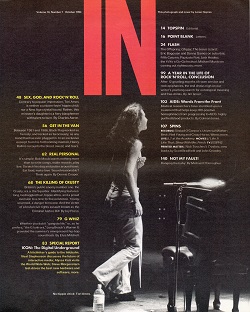
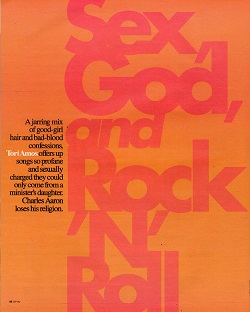 
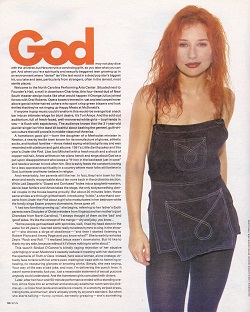 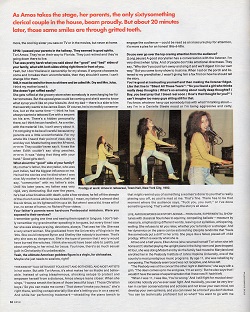
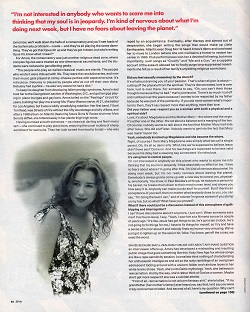 
[scans by Sakre Heinze]
t o r i p h o r i a
tori amos digital archive
yessaid.com
|